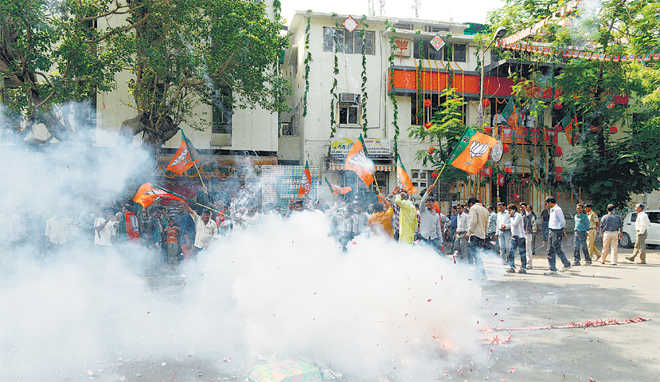
Shanghai’s air pollution has been declining while Delhi is still on the upward path.
Subir Roy
Most Indian politicians will firmly opt for growth, expressing a willingness to live with a degree of pollution as a tradeoff. Concerns over pollution, as also the overarching issue of protecting the environment, are seen as hobbyhorses of civil society groups, being indulged to an extent by the courts through PILs.
The issue came to a boil recently with the Supreme Court firmly refusing, on the eve of Diwali, to reverse its earlier order disallowing the sale and stocking of firecrackers in NCR. The dramatic element was the original PIL seeking the ban being filed in the name of three infants. This was to highlight the issue of intergenerational equity –what kind of a world do we create through our actions for our children to grow up and live in? Even when ailments may not be apparent, they may be wreaking havoc within. Air pollution, for example, causes dysfunction of the central nervous system of children and the elderly.
As Delhi grappled with the ban amidst murmurs of grassroots protest, political leaders should have shown the way, taken a stand and said they will not burn firecrackers because it is bad for air quality and public health, the young being particularly vulnerable.
An emerging conflict
Instead, this is what Shivraj Chauhan, the long standing BJP chief minister of Madhya Pradesh, had to say a day before Diwali, “Crackers alone don’t contribute to pollution. We will light earthen lamps and also burst a few crackers. The environment is important but so are traditions.”
He unhesitatingly highlighted the conflict that can emerge between health and science on the one hand and traditional practice on the other and where he himself stood. By firmly opting for tradition irrespective of which way scientific evidence pointed, he was implicitly rejecting the idea that traditions are not written in stone, they gain and lose ground over time. Society’s leaders need to play an exemplary role in discarding unhealthy traditions even though that may be temporarily somewhat unpopular.
As has happened, within a day of Diwali, the leading global medical journal, Lancet, released a study that found that across the world, environmental pollution killed 90 lakh or 16 per cent of all those who died prematurely in 2015. Most of the deaths were from non-infectious diseases – the scourge of modern life after antibiotics had conquered infectious diseases -- linked to pollution like heart disease, stroke and lung cancer. This is thrice the number of deaths caused by the communicable demons AIDS, Malaria and TB combined.
Now that’s the global picture. What of a poor country like India and, in particular, what affects its poor? The study finds that nearly 92 per cent of all deaths related to pollution occurred in low and middle income countries. Diseases caused by pollution affect the minorities and marginalised the most.
The burden of illness
The disease burden of a society carries an obvious economic cost. The study found that historically the issue of pollution has been neglected in public perception in low and middle income countries, despite its proven ill-effects.
The study has quantified the costs. Pollution related diseases cause productivity loss and shave off up to 2 per cent of GDP in low and middle income countries. Pollution causes a welfare loss of 6.2 per cent of global economic output per year.
Where does India stand in this scenario? It does about the worst. Being a large country with a big population it will figure near the top in any global league table, good or bad. So a comparison with China is appropriate.
China, which has a slightly higher population than India nevertheless came after India, recording the second highest level of pollution related deaths at 1.8 million. In the list of the share of global deaths accounted for by individual countries, India ranks fifth whereas China ranks 16th. It is not surprising that China, which was a global bottom ranker in pollution not so long ago, has substantially got its act together and made a positive impact on its pollution levels.
The killer-in-chief
Air pollution is by far the worst. It accounted for 65 lakh of the total 90 lakh pollution related deaths worldwide in 2015. This included both outdoor pollution like automobile and industrial exhausts and indoor pollution like what poor women in India have to live with while cooking on chullahs by burning biomass. And of, course, air pollution in Delhi in recent years during Diwali was about the worst in the world. The effect of Chinese public policy: Shanghai’s air pollution peaked in 2012 and has thereafter been declining.
But pollution can be contained and reduced, as the better off countries have done through laws and regulation mandating clean air, clean water and chemical safety. Says the study, “High income countries have achieved this progress while increasing GDP by 250 per cent…. The claim that pollution control stifles economic growth and that poor countries must pass through a phase of pollution and disease on the road to prosperity has repeatedly been proved untrue.”
The writer is a senior journalist



























